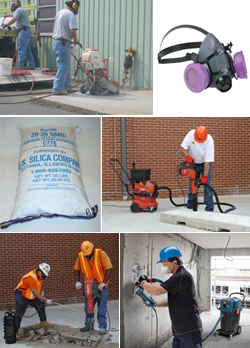 Respirable Crystalline Silica
Respirable Crystalline Silica
Respirable Crystalline Silica
Crystalline silica is commonly found in sand, rock, concrete, brick, mortar, porcelain, ceramic, plaster and many other products. When these materials are manipulated in such a way that they create dust, some fraction of that dust may include particles small enough to become respirable. Respirable sized particles can reach the deeper recesses of the lungs. The inhalation of respirable crystalline silica over time can cause adverse health effects, the most common of which is silicosis.
What is Silicosis?
Silicosis is a progressive disease, which is caused by inhalation of respirable crystalline silica and is marked by inflammation and scarring of the lungs. Symptoms of silicosis include shortness of breath, fatigue, loss of appetite, chest pain, non-productive cough and respiratory failure.
Health Effects
- Lung cancer - Silica has been classified as a human lung carcinogen
- Bronchitis/Chronic Obstructive Pulmonary Disorder
- Tuberculosis - Silicosis makes an individual more susceptible to TB
- Scleroderma - A disease affecting skin, blood vessels, joints and skeletal muscles
- Possible renal disease
Reducing Exposure
Reduce exposures to respirable crystalline silica by:
- Eliminating the use of materials containing crystalline silica or finding alternative products, which contain less silica.
- Using wet methods to keep dust generation to a minimum.
- Using engineering controls such as:
- dust extractors with HEPA filters, which attach directly to the tool
- exhausted enclosures
- other local exhaust ventilation
- Maintaining dust control systems to ensure they are functioning properly.
- Using respirators as directed in the University’s Silica Exposure Control Plan and Respiratory Protection Program.
- Cleaning surfaces with a HEPA vacuum or wet mopping/wiping. Never dry sweep or use compressed air to clean surfaces.
Please contact Environmental Safety, Sustainability and Risk (ESSR) at 301-405-3960 or osh@umd.edu if you have any questions or work with silica-containing products and an evaluation of this work has not been performed.
